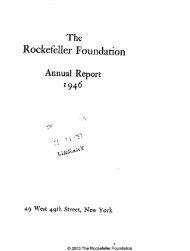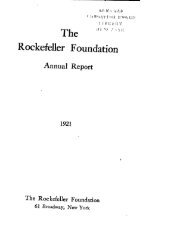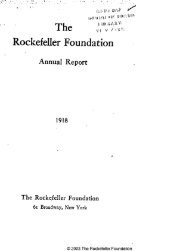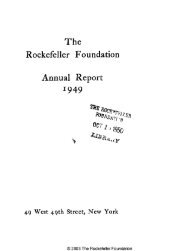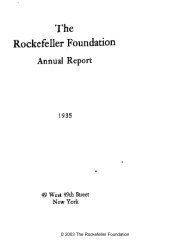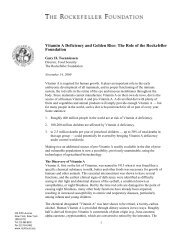Strong Ministries for Strong Health Systems - The Rockefeller
Strong Ministries for Strong Health Systems - The Rockefeller
Strong Ministries for Strong Health Systems - The Rockefeller
Create successful ePaper yourself
Turn your PDF publications into a flip-book with our unique Google optimized e-Paper software.
Relationships with business: public-private<br />
partnerships<br />
<strong>The</strong> business sector, including independent medical<br />
providers, pharmaceutical companies, pharmacies,<br />
employers, and insurers represented another set of<br />
relationships to manage. Sometimes considered to<br />
have “little interest in health,” but to be more focused on<br />
the business interests of their particular company in the<br />
health care enterprise, they were in fact, helpful to some<br />
ministers (n=8) to increase access to needed services<br />
and resources. Most ministers felt concerted ef<strong>for</strong>t had<br />
the potential to lead to more effective collaborations.<br />
Stakeholders noted that the business community<br />
might assist ministries with expertise on contracting,<br />
financial management, institutional management, and<br />
staff training, tapping into both in-country and global<br />
infrastructures, but there was limited evidence of this<br />
actually happening.<br />
About 20% of ministers reported little or no collaborations<br />
with the business sector; some of this was in<br />
countries where the business sector had been weakened<br />
by political strife and there was little opportunity<br />
<strong>for</strong> effective collaboration. <strong>The</strong>re were examples of<br />
different ministers from the same country having different<br />
attitudes and relationships with business, so<br />
the lack of links to business in some countries may be<br />
more individual than structural.<br />
Sixty-percent of the cost of health care is paid on a fee<strong>for</strong>-service<br />
basis. In my country, there are lots of private<br />
entrepreneurs in the countryside, and medicine is<br />
practically like food. But the private sector’s role is in<br />
the service sector, how they can be contracted <strong>for</strong> support<br />
of the public sector? This was the major focus of<br />
my time at the ministry. I went to a mining company<br />
and asked them to expand care from their employees<br />
to the families and communities in their original area<br />
and assist with medical stores, training staff, and with<br />
product flow.” —FMOH<br />
Within the bounds of public policy, we encourage investment<br />
in facilities and pharmaceuticals; we regulate<br />
the private sector—they are more aggressive, but we<br />
control them.” —MOH<br />
A challenge is bringing business in to work effectively<br />
with the State. We created public private partnerships<br />
to maximize consumer participation, but this is difficult<br />
because there’s no experience of the public being<br />
consumers, making demands from their point of view.<br />
<strong>The</strong>re is also community activity trying to help them<br />
learn how to organize themselves, but in these early<br />
stages, it’s quite conflictual. You just have to listen to<br />
their different points of view.” —MOH<br />
Relationships with donors: gaining support<br />
while maintaining autonomy<br />
Although donors are predominantly from outside the<br />
country, the minister’s role in managing these relationships<br />
is one of the major “in-country” challenges. On<br />
the subject of donors, sixteen ministers discussed<br />
global health initiatives and fewer discussed bilateral<br />
donors (7) and foundations (6), though when asked to<br />
characterize their relationships with donors on a scale<br />
from 1 (work closely together) to 5 (no relationship),<br />
bilateral donors were ranked 1, followed by foundations<br />
(1.5) and global health initiatives (1.9). In contrast<br />
to their relationships to national partners, where the<br />
focus is often to “make a case <strong>for</strong> health,” most outside<br />
donors were described as having an explicit interest in<br />
the health outcomes of specific populations, tackling<br />
specific diseases, and more recently, health system<br />
strengthening, including health work<strong>for</strong>ce.<br />
“<strong>The</strong> donor staff at the country level was often weak.<br />
<strong>The</strong>y wasted money on diseases versus dealing with<br />
the health system. <strong>The</strong>y talk a good game, but on the<br />
ground don't follow-up and certainly don't work consistently<br />
toward the country's goals.” -FMOH<br />
“Another major challenge was donor management.<br />
Eighty percent of the ministry’s budget is from overseas<br />
development aid, and [these donors] were essentially<br />
partitioning the country according to their interests,<br />
fighting among themselves to protect their area and not<br />
often cooperating with the Ministry of <strong>Health</strong>. So the<br />
big challenge was how to convene and get them to adhere<br />
to our plan.” –FMOH<br />
Challenges inherent in these collaborations, there<strong>for</strong>e, differed from those experienced with in-country collaborators, although<br />
they loomed large. Depending on the donor organization, these may include:<br />
• rigidity in programming, and priorities that are inconsistent with country priorities;<br />
• donor staff inadequacies, including low levels of cultural competency and lack of knowledge regarding local conditions;<br />
• disproportionate power; and<br />
• inadequate resources.<br />
16 <strong>Strong</strong> <strong>Ministries</strong> <strong>for</strong> <strong>Strong</strong> <strong>Health</strong> <strong>Systems</strong>



